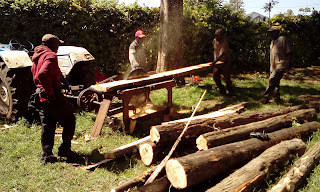In the
village where I grew up, every home had a basket. It may have been made of
sisal or nylon thread. It might also have been made from reed straw but there
was no family without one. The basket, coupled with an account with one of the
three shopkeepers in the entire village ensured that everyone in the village
could do their monthly, weekly, or arbitrary (never impulse) shopping.
Sugar and
rice used to be packed into khaki paper bags. Even the tape to seal the bags
was made from paper coated on one side with a sugar solution which the
shopkeeper would lick before sticking it on. It used to be a really neat affair
and it appeared as if all shopkeepers had been well trained in packing stuff.
That covers
our history lesson for 90s kids and millennials. Then came plastic bags marking
the extinction of all traditional woven baskets. Every Mama Mboga (Green
Grocer) in villages and estates across the country could be seen with packets
of the light-weight clear bags which would make her lick her fingers before
rubbing on the flimsy material to open it up to pack tomatoes and sukuma wiki
(kales).
Travelling Light
Many people,
particularly men, do not carry bags any more. They can buy whatever they need
and get it packed into our ubiquitous plastic bags. People’s busy schedules do
not have to include rushing to the house to pick a kiondo (woven basket) whenever they need to buy and carry
something. People have gotten used to travelling light. That era however, is coming
to an abrupt end in the next few days.
Versatility Galore
A plastic
bag can be used as a carrier bag, food dish, eating glove, and garbage bag. It
is hard to imagine how life was before the plastic bags came to be widely used.
It is even harder to imagine how life will be without them seeing as it is that
they occupy every space of our living memories. So many products will have to be
introduced into our market so as to compensate for every function of our
beloved plastic bags.
Peculiar Kenyan Habits
There are
people who sell boiled eggs and smokies from wheeled dispensers. They use
plastic bags as serviettes to serve their addicted customers. At the end of
their working day, they wheel their trolleys away with all their stock and leftovers.
If you come to the site later, you can still tell the exact spot where they had
been conducting their business. This is because; their faithful customers would
have dropped every single piece of plastic film on which they had been served
their favourite delicacy. The entire area would be littered with the now dirty
plastics.
If you visit
Automated Teller Machines (ATMs), you will notice a small square litter bin placed
on the floor right next to the machine. You are supposed to throw your receipt
into the bin if you don’t want to take it home with you. The amazing thing is
that most of these receipts end up on the floor all around the largely empty
bin because people don’t bother to ensure that they land in the bin. The even
more amazing thing is that when the machine asks someone whether he wants a
receipt for the transaction, he clicks yes and yet he only glances at it for
only a second before crumpling it and carelessly throwing it on the floor. Why
didn’t he just tell the machine that he doesn’t need a printed receipt because
he can read his balance on the screen?
Why, you
might ask, is the Layman going into a long discourse of smoky eaters and ATM
users? Well, it is just to show you how after the plastic bag ban, we will
merely change from littering with something that takes 50 years to decompose to
another thing that possibly takes much less time. The littering however is
bound to remain constant. The ban will not influence our peculiar habits in any
way. If anything, some people might be encouraged to litter more because they
will feel like they are doing the environment a favour.
‘Ngamia One’ a Still-Birth
We have just
discovered huge oil reserves in the country which are yet to be tapped. One of
the most useful by-products of crude oil is (you guessed it!) polythene, used
to make the now illegal plastic bags. It is safe to say that that aspect of the
project is still-born. Our hope to supply all our local plastic needs while
exporting the rest might remain a pipe dream.
Accept and Move On
I am not
looking forward to a life without my beloved Jualas (of which I, like many other Kenyans have a large stock of
in my house). I however do not have a choice because nobody will ask me what I
think before deciding. On that account, I will accept and move on into the
uncertain future. What else is there to do for a humble Layman?



















